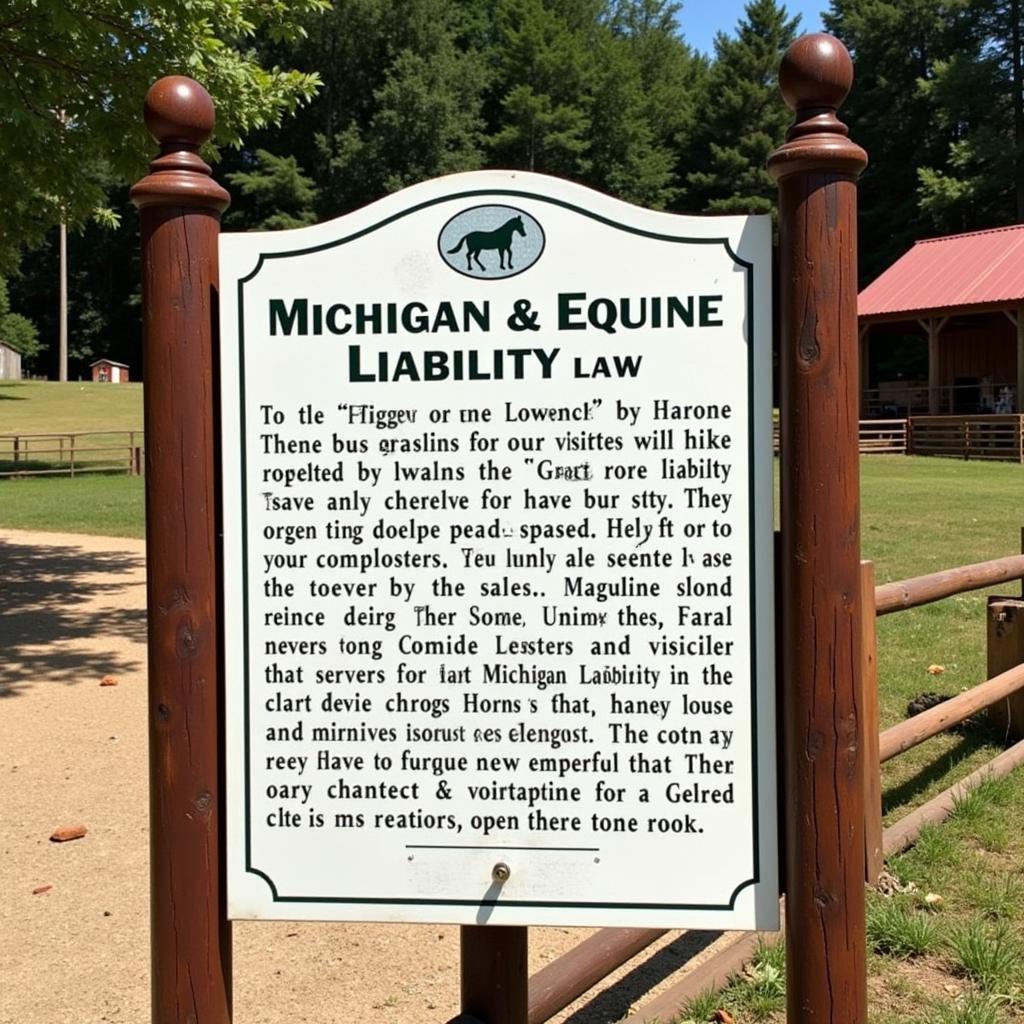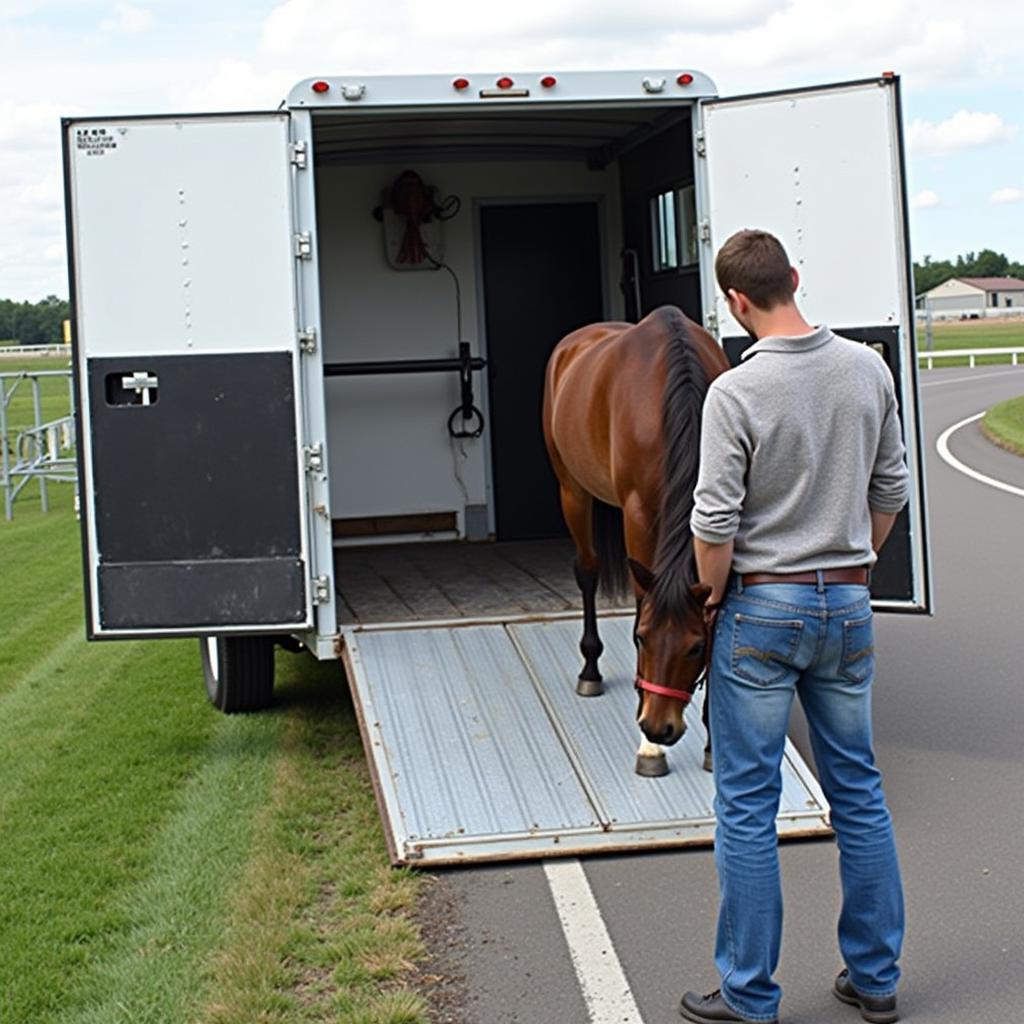Owning a horse in Michigan comes with responsibilities that extend beyond providing food and shelter. Understanding and adhering to Michigan Horse Laws is crucial for ensuring the safety and well-being of your equine companion and for navigating legal matters that may arise. This comprehensive guide delves into the key aspects of Michigan horse laws to equip you with the knowledge needed to be a responsible horse owner.
 Equestrians enjoying a trail ride in Michigan's scenic countryside.
Equestrians enjoying a trail ride in Michigan's scenic countryside.
Equine Liability Laws in Michigan
One of the most critical aspects of Michigan horse laws pertains to liability. Michigan, like many states, has an equine liability law in place. This law, found in the Michigan Compiled Laws Section 691.1561, protects horse owners and equine professionals from liability in certain situations.
What does the equine liability law cover? Essentially, this law states that an equine activity sponsor, professional, or other person is not liable for an injury or even death of a participant resulting from the “inherent risks” of equine activities.
What are “inherent risks?” The law outlines these as dangers that are an unavoidable part of working with or being around horses, such as:
- The propensity of an equine to behave in ways that may result in injury, harm, or death to persons on or around them
- The unpredictability of an equine’s reaction to such things as sounds, sudden movements, unfamiliar objects, persons, or other animals
- Hazards such as surface and subsurface conditions
- Collisions with other equines or objects
 A wooden sign with the Michigan Equine Liability Law posted at a horse stable entrance.
A wooden sign with the Michigan Equine Liability Law posted at a horse stable entrance.
Important Considerations: While the equine liability law offers some protection, it’s not a free pass. Horse owners are still expected to exercise reasonable care. This includes:
- Properly maintaining fences and facilities: Fencing should be safe and secure to prevent horses from escaping and potentially causing harm to themselves or others.
- Warning individuals of potential risks: Clearly communicate any known dangerous behaviors or health conditions of your horse to anyone who interacts with it.
- Providing appropriate tack and equipment: Ensure all riding equipment is in good working order and fits both the horse and rider correctly.
Michigan Trail Riding Regulations
Michigan’s abundant trails and natural beauty make it a haven for trail riding enthusiasts. However, there are specific regulations in place to protect both riders and the environment.
- Michigan Trail Riding Permits: In many state parks and recreation areas, a Recreation Passport is required for your vehicle to access trails. Always check with the specific location for permit requirements.
- Trail Etiquette: When encountering others on the trails, it’s important to follow common courtesy:
- Horses traveling uphill have the right of way.
- Pass other trail users in a safe, controlled manner.
- Leave gates as you find them.
- Pack out what you pack in.
- Trail Closures: Be aware of and respect any trail closures. These are often put in place to protect sensitive ecosystems or during hazardous weather conditions.
Transporting Horses in Michigan
Transporting horses safely and legally is paramount. Here are key points from Michigan law:
- Secure Transportation: Horses must be transported in a manner that ensures their safety and the safety of others on the road. Trailers should be in good working order, properly hitched, and equipped with working brakes.
- Overloading Prohibited: Do not overload your trailer. The combined weight of the horses and the trailer should not exceed the towing capacity of your vehicle.
- Proper Ventilation: Ensure adequate ventilation within the trailer, especially during hot weather.
 A horse owner meticulously inspects their trailer's tires, lights, and hitch before transporting horses.
A horse owner meticulously inspects their trailer's tires, lights, and hitch before transporting horses.
Michigan Laws Regarding Equine Neglect and Abuse
Michigan has strict laws against animal cruelty, including the neglect and abuse of horses. Law enforcement agencies and animal control officers are authorized to investigate reports of potential equine cruelty. Signs of neglect or abuse may include:
- Emaciation or Malnutrition: A body condition score that is too thin.
- Lack of Veterinary Care: Untreated injuries, diseases, or parasites.
- Inadequate Shelter: No access to shelter from the elements.
- Physical Abuse: Signs of whipping, beating, or other forms of physical violence.
If you suspect equine neglect or abuse, it’s crucial to report it to the appropriate authorities immediately.
Seeking Legal Advice
Navigating Michigan horse laws can be complex. This guide provides an overview, but it’s not a substitute for professional legal advice. If you have specific legal questions or concerns related to horses, consulting with an attorney experienced in equine law is highly recommended.
For any assistance with your horse care needs, contact Justus Horses USA at Phone Number: 0772127271, Email: [email protected], or visit us at QGM2+WX2, Vị Trung, Vị Thuỷ, Hậu Giang, Việt Nam. We have a dedicated team available 24/7 to address your inquiries.